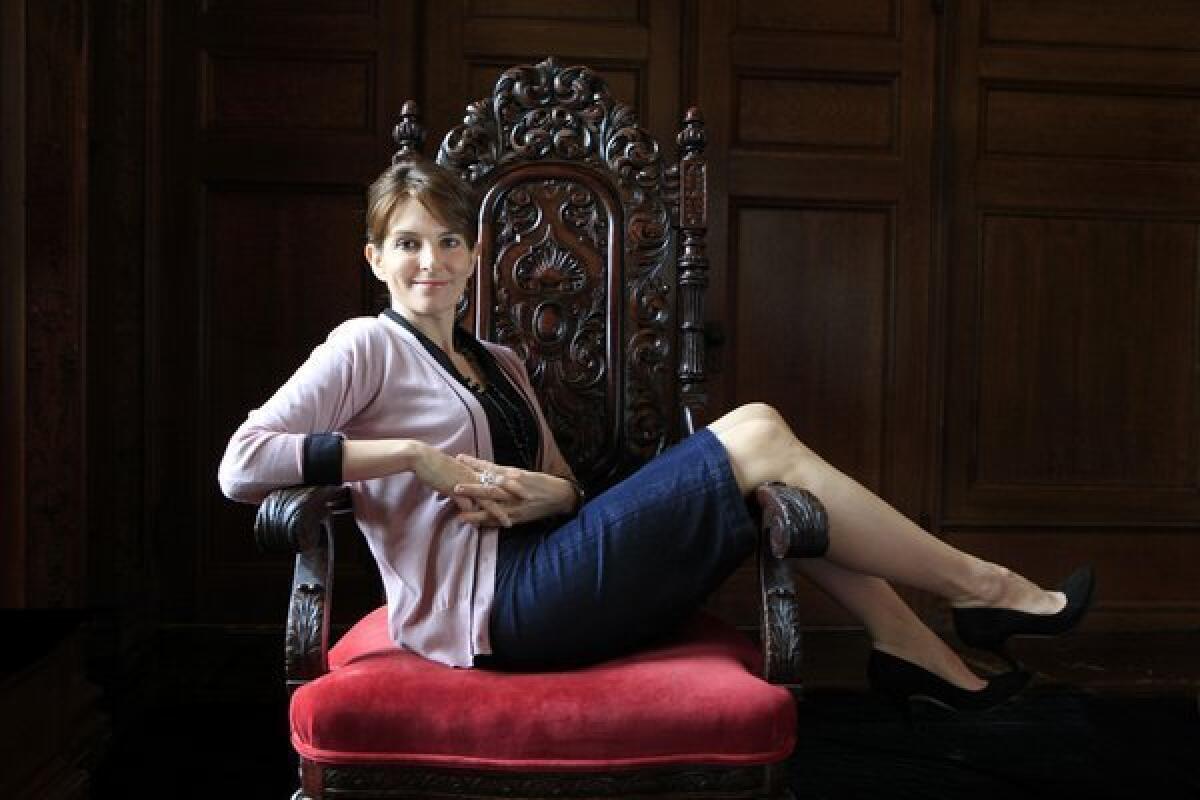Tina Fey, team queen

PURCHASE, N.Y. — — Producers, take note. This is what Tina Fey would like to do in a movie: “Walk away from an explosion. Speak very fast German, then kill a Nazi. And land the Millennium Falcon in a dangerous situation. Those are the only three things I aspire to do on film. And all of those things should be in the same film.”
Short of Harrison Ford’s allowing her to remake his oeuvre, Fey is likely to end up disappointed. Not that the lack of those things is preventing her from making movies — or Emmy-winning TV series. Today she’s chewing on rice cakes and sitting behind a desk in yellow rubber boots, awaiting a lighting change on set at a college about 30 miles north of New York City that is standing in for Princeton for her next film, the Paul Weitz comedy “Admission.” It’s a good way for her to squeeze in one more non-TV experience in the dwindling weeks before she returns to the”30 Rock” writers’ room for her show’s seventh and final season.
A bit melancholy but pragmatic, Fey understands it’s time to close up that shop at the “Rock.” “Things do end, and you want them to end when we’re running through the finish line and not limping to it and not vomiting or pooping ourselves,” she says. “You have to muster the maturity to leave it. But we’re all going to be a mess.”
Without “30 Rock,” Fey will be left without a team for one of the very few periods in her professional career. She’s done hugely successful work solo — writing all “20 drafts” of “Mean Girls,” coming up with her bestselling “Bossypants” memoir — but for the most part, Fey is the ultimate team player. She tried stand-up only “once or twice on the amateur level” at a place that didn’t even sell alcohol, “so there was no heckling.”
She blossomed in the world of sketch and improv with Second City and eventually got her big break on the writing staff of “Saturday Night Live.”She’s too talented to have stayed in the writers’ room forever — Fey’s later Sarah Palin impersonation while guesting on the show made her a breakout star of international proportions — but even today, as she discusses the end of the show she created, co-runs (with executive producer and fellow “SNL” vet Robert Carlock) and stars in, Fey tends toward the “us” and the “we.”
Carlock says Fey’s appeal lies in her ability to “commit completely to everything.” Though Fey herself isn’t showoffy or spouting jokes left and right when not on camera, once she’s committed to that sketch or that bit or that impression, he says, “she won’t shy away from anything.”
In addition, Fey has made smart funny. She’s not above a pratfall, or having food thrown at her, or dressing up like an old hag to get a joke, but, says Carlock, “she has the rare ability to communicate intelligence without it being distancing. She’s able to make the character of a smart, sharp woman play as comic, which is very hard.”
Though she’s slowly become more adept at acting, performance is almost incidental to Fey, who decided a long time ago that if she hadn’t been a writer first, no one would have invited her to the party. “I’d never have been allowed in; I never would have booked anything.”
Winning the Emmy in 2008 for her role as Liz Lemon, head writer of a sketch comedy show, gave her an unexpected boost that rippled not just personally but professionally, she’s certain: “It validated for me and maybe a little on the outside that it was OK that I was in the show. I think in that first season there were questions in interviews like ‘Why is she in it? She’s not a professional actor.’”
No matter how good she gets, it’s unlikely that Fey will ever consider herself anything other than average — mainly because, as she says, there are only four good actors in the world: Meryl Streep, Alec Baldwin, Helen Mirren and Don Cheadle. “Those are the people who are good in anything they do,” she says. “Everyone else has two moves and one side of their face, and they play something that’s kind of like them or they take a big swing and have two other characters in a truck somewhere. Everyone else is just trying to make it day to day.”
And now that she’s got her own measure of fame, Fey says she’s more and more conscious of what messages her daughters (Alice was born in 2005, Penelope just last year) are getting about being famous and making their own way. “There’s this Nickelodeon show where the boy band sings, ‘I wanna be famous!’ Well, why? Everyone just wants to be famous. The idea [to get across is] that being famous in itself is not to be valued; that’s not important,” she says.
Instead, she’d like to see her kids grow up to not just be their own team players but also to shape their own destiny — much as she has. If the world isn’t going to hand you your every wish and desire, she seems to want to say, just write it yourself. If they wanted to become actors, says Fey, “I’d try and spare them from the life of an actor, where you only get work if someone picks you. You want to be someone who makes your own stuff. If you make your own thing, you can be doing it at a community theater or on Broadway. No one can really stop you. It’s a better, more cool life.”
She should know.
More to Read
From the Oscars to the Emmys.
Get the Envelope newsletter for exclusive awards season coverage, behind-the-scenes stories from the Envelope podcast and columnist Glenn Whipp’s must-read analysis.
You may occasionally receive promotional content from the Los Angeles Times.






